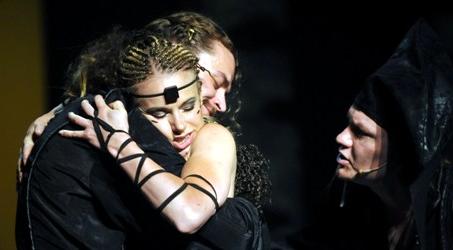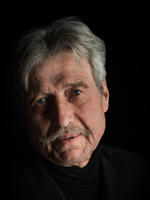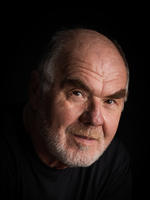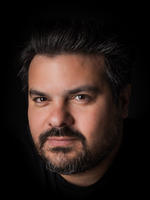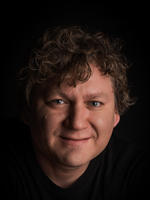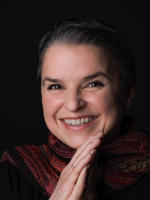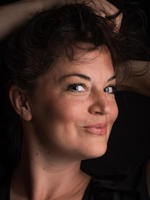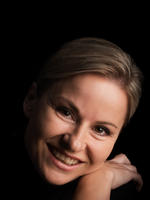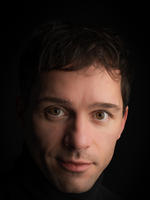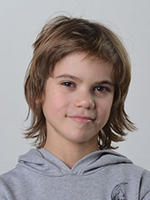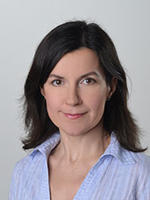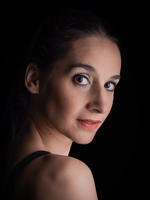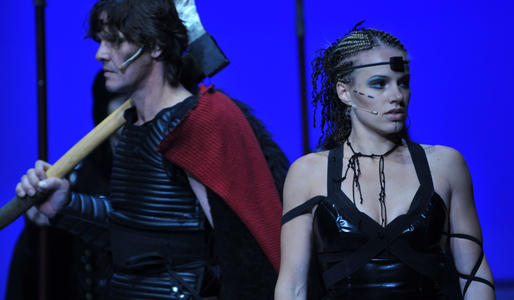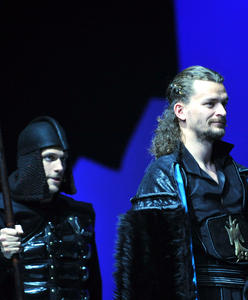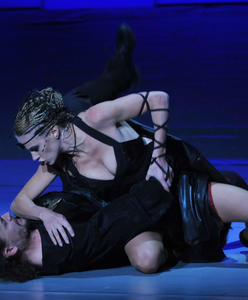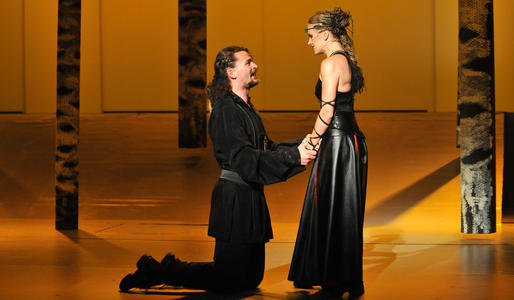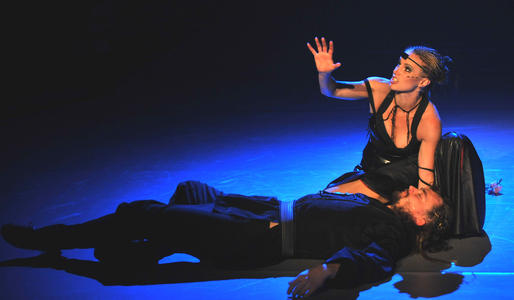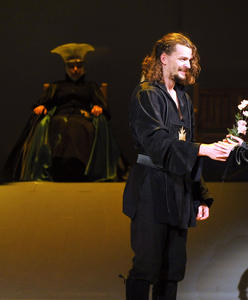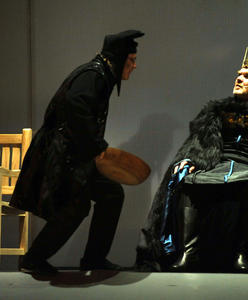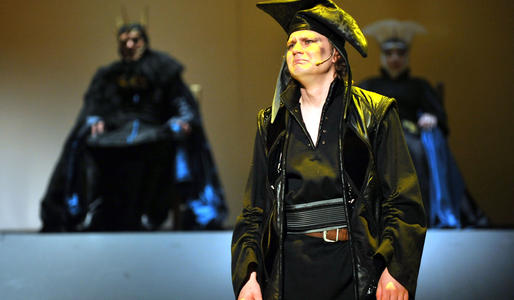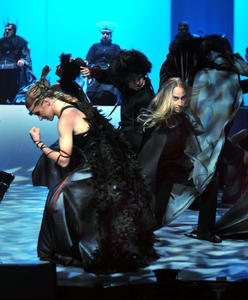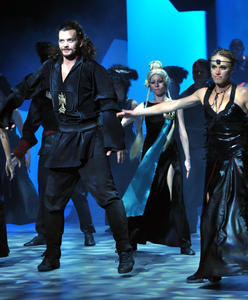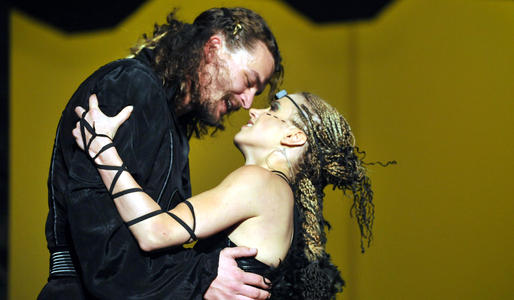From far away to the north, but the theme of love, revenge and hatred is close to us all
Lenka Suchá 10. June 2009 zdroj Brněnský deník
Brno City Theatre ended the season with an original musical inspired by northern mythology.
Brno City Theatre does not only focus its dramaturgy on proven musical super hits. After world-famous Les Misérables and Evita, they contributed to the mosaic of contemporary musical theatre with the original authorial musical entitled Ballad of Love (Singoalla), which had its premiere at the Music Theatre on 6th June. The original musicals produced by Brno City Theatre in previous seasons have been inspired either by biblical stories (Babylon), historical events (Koločava), Homer's epics (The Odyssey) or current events (World of Angels).
This time, Brno took a risk and chose a topic which is very distant to Czechs: northern mythology. However, when watching the musical, one will soon see that Brno's producers didn't make a bad choice at all. Even though we may not have perfect knowledge of the historical background and the local realia, the mysteriously mystical world somewhere in the Scandinavian kingdom creates an attractive setting for an otherwise timeless story about love and revenge.
The original chamber version of the musical Singoalla was produced by the drama writer and director Rino Brezina, together with music composer Daniel Fikejz, twelve years ago at Klicpera's Theatre in Hradec Králové. In the current production, the creative team was supplemented by librettist Ivan Huvar and the author of the final text version, Petr Gazdík. For him it is the first big production after the composed evening Jazz Side Story and several productions from his own G-Studio.
The first half of the Brno production of Ballad of Love has a very swift tempo which practically gives the spectators no time to breathe, pulling them into the story naturally. The course of the story is made special by demanding acrobatic elements carried out by the main actors, as well as by daring dance performances choreographed by Lucie Holánková.
The stage created by Daniel Dvořák enables the creation of a lyrical dream-like atmosphere with a large number of light contrasts: there are no stunning effects but simply and yet purposefully interpreted natural elements: wooden logs, fire and smoke. Two semi-transparent curtains are used on the stage to divide up the area inventively.
The costumes from Silva Zimula Hanáková's workshop, with prevailing red and black colours, suggest mysteriousness and shamanic rituals. However, Gazdík's production evokes its main power and emotions thanks to the music. The mystically-tuned score combines rock and jazz melodies with classical as well as ethnic elements. The live twenty-five-member orchestra, under the leadership of Dan Kalousek, interpreted the score flawlessly. And even though Ballad of Love doesn't provide any major hit which the spectators can hum on their way home, the music is original and inventive as a whole. In the second part, however, the story slows down unnecessarily as the authors also added aspects from the historical context to the plot, including a plague epidemic, religious rituals and philosophical thoughts.
The main focus shifts from the young lovers to the boy Sorgbarn, who is the son of Singoalla and the up-to-now unsuspecting Erland (this demanding child role was acted excellently by Marek Hurák). Only the end itself brings hope and a belief in a better future.
The title character of the pagan Singoalla, the femme fatale, wife and lover, as well as mother, was full of graceful motion thanks to young Marta Prokopová. Her lover, Christian Erland, was depicted by Jiří Mach as a manly and charismatic hero.
Brno City Theatre has finished one of the fullest seasons of the past few years. It closed it with a pleasant attempt at an original authorial production which brought otherwise distant northern mythology closer to Czech theatregoers.
Brno bet on the right horse with balladic Singoalla
Vítězslav Sladký 9. June 2009 zdroj musical-opereta.cz
Before visiting the new musical at Brno City Theatre - Ballad of Love (Singoalla), I asked myself whether the dramaturgic team hadn't made a mistake this time. How much do we, the Czechs, know about northern mythology? Will the theme of the love between untamable Singoalla and the visionary Erland be easy to understand and sufficiently attractive for the audience. Luckily, I found the answer for my somewhat doubt-filled questions during the performance.
The musical ballad Singoalla was written by musical composer Daniel Fikejz, together with librettist Ivan Huvar; the author of the theme and the original script is the playwright and director Rino Brezina. All was adapted to suit the Brno City Theatre ensemble by Petr Gazdík, for whom this was the first, well-deserved, large directorial role. Petr Gazdík has moved this work closer to contemporary European musical production by altering the script and libretto and adapting it to suit the needs of a larger ensemble. The conductor, Igor Vavrda, has created an orchestral arrangement for the theatre orchestra, which consists of approximately twenty-five members.
The new arrangement has somewhat reduced the "ethnicity" of the music, but the space of the Musical Theatre needs a larger orchestra, and the Brno one played really well under the direction of Karel Albrecht, with excellent colour of sound and great use of percussion. On the whole, the music to Singoalla sounds new. It may not have a distinct hit but such a piece surely wouldn't fit into the overall musical conception, which is very successfully balanced out with the prose.
There was a lot to watch in the Ballad. It is the case with Marta Prokopová, who is a really fiery, beautiful and mysterious Singoalla, and the distinct, lightly erotic but in no way vulgar costumes from the workshop of Sylva Zimula Hanáková and the well-produced scenography by Daniel Dvořák. It was lacking in the oft-seen now-fashionable musical descriptiveness which often borders on the kitsch, and it gave the spectators the opportunity to let their own imagination run wild without looking sparse. It was proof that there doesn't need to be a real forest on the stage, and real horses don't need to gallop or grand ships don't need to sail there either…
The whole work is penetrated throughout by a purity not only in terms of its faithfulness to the genre but also as far as the production is concerned, a purity which seems to have disappeared from many contemporary productions. Even though the Ballad certainly isn't the saviour of the Czech musical scene and it isn't flawless, I found a certain theatricality in it in the best sense of word, something which makes it worthwhile to go to the theatre and think about it. This theatricality isn't created only by the pieces of scenery but also from the real work of the dramaturgist, the director and the actors.
The musical starts with little Erland fighting with his friend Šek and immediately afterwards with a scene featuring the arrival of Singoalla's tribe on the border of Erland's kingdom. It is in this part of the play that Petr Gazdík, in cooperation with choreographer Lucie Holánková, serves up the most eventful show for the spectators - acrobatic scenes, daring dance performances as well as lightly erotic moments which Erland's friend Šek comments on wittily.
I saw young Marta Prokopová in the title role, playing the demanding role of the femme fatale, wife, lover and mother with immense passion. She was excellent, both as an actress and as far as movement is concerned. Her two co-players were also very distinct, the eternal lover Erland acted by charismatic Jiří Mach and the broken down suitor Asim, a role well suited for Michal Šebek as it is more for rockers and is of a rougher character. Other roles which will be popular with the spectators are Erland's friend Šek, whom I saw played by the excellent Alan Novotný (his singing and movement were excellent), and the Shaman, who was acted well by Zuzana Maurery.
Also, the actors in children's roles, Marek Hurák and David Žák, did well.
It was somewhat risky to produce the Ballad. Its historical background is as distant to Czech spectators as the stories about Forefather Čech to the Swedish or the Czech village atmosphere in The Bartered Bride to the Japanese (which doesn't mean that they wouldn't enjoy listening to it), but the topic of love, revenge and purgatory is universal. After the world-famous Les Misérables and Evita, and before Mozart!, Brno City Theatre could afford to take this risk. Singoalla offers an alternative, somewhat "different musical". I believe that it has its place on the Czech stage.
About passion, cruelty and big love
Tomáš Hejzlar 9. June 2009 zdroj Haló noviny
The history of mankind has created a series of myths, legends and ballads about love. People have passed them on from generation to generation because they incorporated their desires, imaginations and wishes at a suprapersonal and timeless level, similarly as fairy-tales do.
A week ago, the Music Theatre of Brno City Theatre performed a new production with the beautiful name Ballad of Love - originally called Singoalla, after the name of a woman of pagan blood who is, as are all who are similar to her, a part of nature and equipped with feminine force and abilities. They may seem supernatural from today's point of view but in the stage form, they affect us with the force of unbelievably strong, almost esoterically captivating imagination.
Perhaps similarly as with Hikmet's eternal Legend of Love…
Swedish director and librettist Rino Brezina, together with the composer Daniel Fikejz, came up with the original idea of bringing this charming northern story of love, passion, betrayal, revenge and forgiveness, which comes from some time around the 10th century, onto the modern stage.
It is a story of the tragic love between beautiful Singoalla and visionary thinker Erland somewhere in a northern kingdom where pagan gods rule and where the rituals of the old and newly coming ages mix together. The stories of the fateful lovers (both of them have already had other life partners assigned to them) are highly passionate and often cruel, and always have a tragic edge to them, yet they always leave a strange feeling of hope in us.
Petr Gazdík has directed and adapted this work exceptionally successfully and produced today's Brno version. "I believe that the spectators will experience, together with the actors, a thrilling story of the love of four people whose lives are affected by a curse. A story full of real feelings and emotions… I would like this to be the most attractive aspect of the 'Ballad of Love' ", said the successful musical singer and equally experienced drama actor Gazdík before the premiere.
A lucky choice
Brno's musical traditions are among the most distinct in central Europe because they have never just copied foreign examples thoughtlessly, or courted popularity via commercialisation, but on the contrary have taken their own creative route based on the principles of the transformation of the virtues of others. These days, Brno City Theatre is building on these sureties and advantages. It has demonstrated its great reputation even at international festivals and so this display of musical theatre which is starting today is truly a varied and valuable event which this time is accessible to the local public.
When the Open Door Festival of Musical Theatre was born five years ago on the grounds of the very agile, inventive and distinctly artistically above-average Brno City Theatre, it was a kind of throwing down the gauntlet, offering the option of mutually comparing the qualities of both our and foreign ensembles and their performances. The Brno ensemble doesn't need to feel under threat thanks to their clear and perfect professionalism. On the contrary, they can find inspiration for their further work among such a wide field of international competition.
The performance of the recently premiered musical fairy-tale, Ballad of Love, as part of today's opening of the Open Door Festival of Musical Theatre will certainly symbolize the high interpretative values which this show presents every year.

